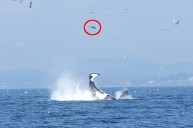Rescuers tried to save a baby whale, but unfortunately, they were unable to save the young whale after it ingested a large plastic bag. Rescuers found plastic all in the creature's stomach.
A beachgoer reported the beached whale and reported it officials. The incident happened at Butler Beach in St. Augustine, Florida. The St. Johns County (SJC) Beach Services shared a tragic Instagram post about the incident. Officials determined the creature was an emaciated dwarf sperm whale.
Rescuers transported the animal from the beach to to "veterinarians for examination." Sadly, they were unable to help the creature and had to "humanely euthanized" it. An autopsy determined the baby whale had "a large plastic bag in its main stomach with associated ulcers."
The SJC Beach Services tried to educate the public about beached animals through social media.
Baby Whale Dies
"If you see a beached marine animal — even a small one, like this whale calf — do NOT push it back in the water; it stranded for a reason, and pushing it back delays humane treatment and care," they said.
In a statement obtained by PEOPLE, a spokesperson for Oceana, lamented the death of the animal. The organization pointed to plastic production and how it's affecting sea life. They felt that the baby whale's death was avoidable.
"Plastic has not only been thrust onto us as a society, but it's also been pushed onto our oceans and marine wildlife. There's nothing natural about a plastic bag in a whale calf's belly," they said. "Plastic production is increasing at a rapid rate, and so too is the amount of plastic going into the oceans."
The spokesperson added, "Many tragedies from plastic in the ocean go unobserved, and the ones we see are just a snapshot. The plastics crisis is deep, wide and pervasive, affecting ecosystems and animals in ways we are only beginning to understand. Our elected leaders must do more to protect marine wildlife from plastic pollution. We need to reduce the production and use of unnecessary single-use plastics for the sake of animals' health, our health and the health of our blue planet."




